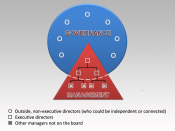'To what extent has corporate governance reduced the separation of ownership and control?'
Corporate governance in its simplest form can be defined as 'having good management to run a company'. (Financial Institutions, Intangibles and Corporate Governance, John Holland, Accounting, Auditing and Accountability, Journal, Vol. 14, Number 4, 2001, p. 13). Unfortunately corporate governance is not that simple, and includes much more than just 'good management'. Corporate governance relates to the self-regulation of an organisation through several mediums including internal and external auditors, independent board members, and the formation of committees to regulate remuneration, audits and nomination, all of which are areas of concern and are susceptible to malpractice from short-termist management.
Corporate Governance has come to the forefront of both the academic and business fields due to the increasing number of scandals in the 1990's including 'world class companies such as Enron, Adelphia, Worldcom, and G.E.' (Understanding the Corporate Governance Quadrilateral, Malla Bhasa, Corporate Governance, Vol.
4, number 4, 2004, p.9). The 'problem' of corporate governance has developed due to the increasing gap between ownership and control of an organisation, management teams have been increasingly employed to run an organisation in the best interests of it's owners, i.e. its share holders. 'The problems of corporate government arise when the rights of share holders are violated.' (Global Corporate Governance, Debates and Challenges, Malla Bhasa, Corporate Governance, Vol.4, Number 2, accessed 24/12/04, Emerald). In this instance the 'stake holder' is the shareholder, Berle and Mean's (1967), identified the problem of the separation and ownership (cited at Accounting and Auditing, Vol.14, Number 4). In placing a manager/management team in control of 'their' organisation, shareholders inevitably take on an element of risk. There is a risk that the management elected may not share the same beliefs and values...


